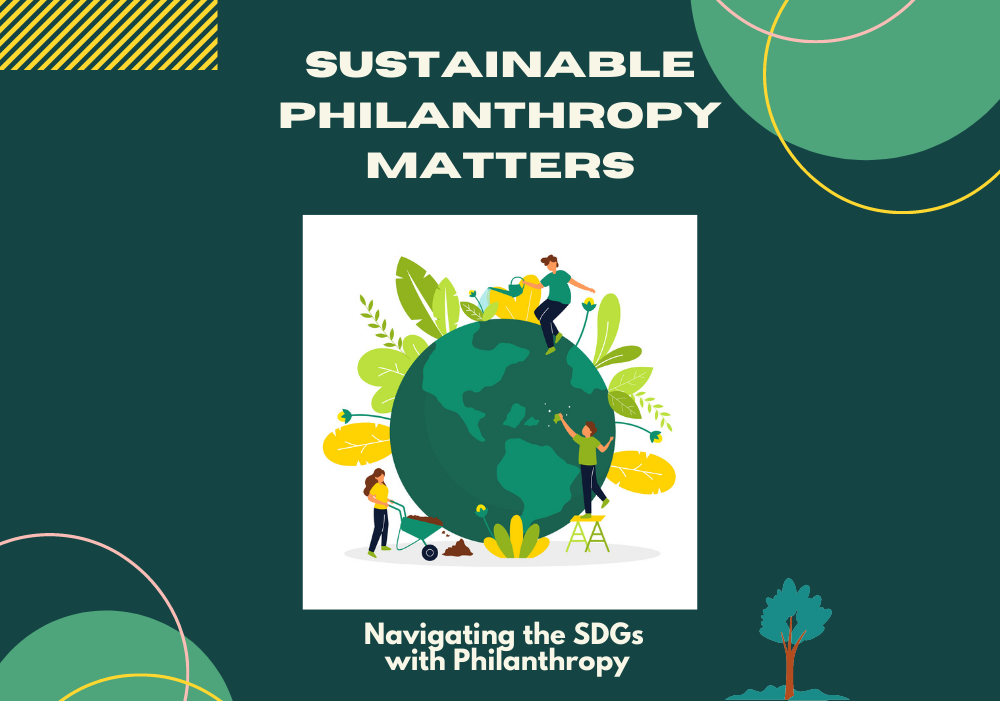Sustainable Philanthropy Matters: Navigating the SDGs with Philanthropy


In this three-part series ‘Sustainable Philanthropy Matters’, we explore the surprisingly intimate relationship between philanthropy and sustainability and how the practice of one can in fact, lead to the advancement of the other. Both of these issues are close to our hearts here at CFS and we want to share how our philanthropy can help preserve our planet, our communities and our future.
Philanthropy has traditionally been aimed at supporting societal needs. In recent years, the increasingly pressing demand for climate reformation requires the influx of tremendous funding to support the advancement of the Sustainable Development Goals (SDGs), from R&D and technological applications to conservation and community efforts. Beyond the responsibilities of governments and businesses, philanthropy has a huge role to play. While this may sound novel, it actually is not and, in this third and final instalment of Sustainable Philanthropy Matters, we examine how philanthropy can help stem the tide of climate change.
The Interconnectedness of Sustainability
At first glance, the 17 SDGs might seem a little daunting, like some miniature Periodic Table meant to scare students. It may help to see this as one concerted effort to effect long-lasting change, to ensure the sustainable survival and thriving of both People and Planet.
This holistic approach is evident in that all the SDGs are, in fact, interconnected. In the last article, this was explained in a sustainable farming example. Besides these issues, the SDGs also help us to realise the borderless world we now live in. For example, rampant slash-and-burn agriculture in Indonesia (BBC News, 2019), droughts in California (Bernstein, 2015) and declining wild salmon populations in the Atlantic (Forseth, Barlaup, Einum, Finstad, Fiske et al, 2019, page 2) all have one thing in common: they affect communities in Singapore.
The first spells an annual onslaught of respiratory problems as haze blankets the country while the latter two impact our food supply, namely oranges and smoked salmon.
Everyone’s Cost to Bear
Those three problems are just some of the innumerable issues worldwide that the SDGs seek to address. A glance at the big picture shows that achieving the SDGs has a hefty price tag of an estimated $5t to $7t, although the silver lining of this is that that achievement could open up $12t of market opportunities (United Nations, 2022).
However, the localised impact demonstrated above makes it abundantly clear that we all have a stake in ensuring that those goals are achieved. Singapore’s enhanced Nationally Determined Contributions (NCCS, 2022) towards the SDGs, executed through initiatives such as the Green Plan 2030 (SG Green Plan, 2022) and 30 by 30 (SFA, 2021), cannot be achieved by the public and private sector alone. It requires individuals’ combined efforts, through practice and philanthropy.
The role of and need for philanthropy is even greater when we consider the Singaporean Government’s stance to avoid being a welfare state and instead, offer tiered and limited safety nets for those in need (MOF, 2020). While there is certainly a need to address the SDGs in the local context—such as those relating to poverty, hunger, health and education—Singaporeans are required to help themselves in this meritocratic system.
Partly because this is clearly easier said than done, a small sum is deducted from employees’ wages in Singapore that goes towards four racially-oriented Self Help Groups. So unless one opts out of this scheme, every salaried resident in Singapore is already involved in some form of philanthropy.
Charities, Charities Everywhere
Of course, that sum is a miniscule drop in the large scheme of things, with $25.69m for the CDAC, $8.54m for Mendaki, $18.87m for SINDA and $0.78m for the Eurasian Community Fund, against a national total of $2.9b donations in 2019 (MCCY, 2020, page 4). Many non-profits and voluntary welfare organisations and their care recipients still rely on the goodwill of philanthropists.
While there are thankfully many generous donors out there, there is also a baffling number of charities and IPCs (Institutes of Public Character, which are held to even more stringent governance standards): 2,281 at the end of 2019, to be exact (MCCY, 2020, pages 13 and 17). Just like the SDGs, more charities are related to addressing societal needs than environmental ones.
That line is blurring today with countless examples: a centre for autism implementing an urban farming programme, a society that safeguards the cleanliness of our waterways for the local wildlife and citizens alike, and tree planting exercises for the public by the Garden City Fund.
Yet, there are still a lot of untapped opportunities. We need to develop programmes and build the capability that will allow our social sector to effectively address the SDGs in the local context and with environmental considerations. That requires funding — for research, pilot programmes and training.
A Touch of Philanthropic Professionalism
In breaking all this new ground, it is prudent to apply a layer of Governance checks over the Social and Environmental orientations and objectives of all the organisations and programmes.
Thankfully, one does not need to worry too much about Governance here in Singapore. Local regulations require charities and IPCs alike to be transparent about their operations, activities and finances.
As a winner of two accolades for transparency and governance at the 2019 Charity Governance Awards, CFS is ever-cognisant of the importance of balancing the outputs and outcomes of charities and their activities with their strategy and operational methods.
If you would like to know more about how CFS can help you source for, identify and evaluate programmes that both meet your philanthropic preferences and address the SDGs, please visit here.
To read the other 2 stories in the ‘Sustainable Philanthropy Matters’ series, please click below:
This article was written by Adam, a Principal Consultant with CFS and an experienced sustainability practitioner. He is an advocate for sustainable practices. His colleagues are still wondering how his monthly household utilities bill is only around $70.
Disclaimer: The opinions expressed in this publication are those of the author. They do not purport to reflect the opinions or views of CFS or its members.
References
- BBC News. (16 September 2019). Indonesia haze: Why do forests keep burning? https://www.bbc.com/news/world-asia-34265922
- Bernstein, Sharon. (2015). California citrus farmers pull up trees, dig reservoirs to survive drought. Reuters. https://www.reuters.com/article/us-usa-california-drought-farmers-idUSKCN0RB15420150911
- Forseth, T., Barlaup, B. T., Einum, S., Finstad, B., Fiske, P, et al. (2019). Status of wild Atlantoc salmon in Norway 2019. https://www.vitenskapsradet.no/Portals/vitenskapsradet/Pdf/Status%20of%20wild%20Atlantic%20salmon%20in%20Norway.pdf
- Ministry of Culture, Community and Youth. (September 2020). Commissioner of Charities: Annual Report 2019. https://www.charities.gov.sg/PublishingImages/Resource-and-Training/Publications/COC-Annual-Reports/Documents/Commissioner%20of%20Charities%20Annual%20Report%202019.pdf
- Ministry of Finance. (Updated 25 November 2020). Singapore Public Sector Outcomes Review: Social Safety Nets.
- National Climate Change Secretariat of Singapore. (28 February 2020). Singapore’s Enhanced Nationally Determined Contribution and Long-Term Low-Emissions Development Strategy. https://www.nccs.gov.sg/media/press-release/singapores-enhanced-nationally-determined-contribution-and-long-term-low-emissions-development-strategy
SG Green Plan. (Updated 28 January 2022). https://www.greenplan.gov.sg/ - Singapore Food Agency. (Updated 17 December 2021).
- United Nations. (Accessed 16 February 2022). FAQ: How much will the implementation of this sustainable development agenda cost? https://www.un.org/sustainabledevelopment/development-agenda/
In this three-part series ‘Sustainable Philanthropy Matters’, we explore the surprisingly intimate relationship between philanthropy and sustainability and how the practice of one can in fact, lead to the advancement of the other. Both of these issues are close to our hearts here at CFS and we want to share how our philanthropy can help preserve our planet, our communities and our future.
Philanthropy has traditionally been aimed at supporting societal needs. In recent years, the increasingly pressing demand for climate reformation requires the influx of tremendous funding to support the advancement of the Sustainable Development Goals (SDGs), from R&D and technological applications to conservation and community efforts. Beyond the responsibilities of governments and businesses, philanthropy has a huge role to play. While this may sound novel, it actually is not and, in this third and final instalment of Sustainable Philanthropy Matters, we examine how philanthropy can help stem the tide of climate change.
The Interconnectedness of Sustainability
At first glance, the 17 SDGs might seem a little daunting, like some miniature Periodic Table meant to scare students. It may help to see this as one concerted effort to effect long-lasting change, to ensure the sustainable survival and thriving of both People and Planet.
This holistic approach is evident in that all the SDGs are, in fact, interconnected. In the last article, this was explained in a sustainable farming example. Besides these issues, the SDGs also help us to realise the borderless world we now live in. For example, rampant slash-and-burn agriculture in Indonesia (BBC News, 2019), droughts in California (Bernstein, 2015) and declining wild salmon populations in the Atlantic (Forseth, Barlaup, Einum, Finstad, Fiske et al, 2019, page 2) all have one thing in common: they affect communities in Singapore.
The first spells an annual onslaught of respiratory problems as haze blankets the country while the latter two impact our food supply, namely oranges and smoked salmon.
Everyone’s Cost to Bear
Those three problems are just some of the innumerable issues worldwide that the SDGs seek to address. A glance at the big picture shows that achieving the SDGs has a hefty price tag of an estimated $5t to $7t, although the silver lining of this is that that achievement could open up $12t of market opportunities (United Nations, 2022).
However, the localised impact demonstrated above makes it abundantly clear that we all have a stake in ensuring that those goals are achieved. Singapore’s enhanced Nationally Determined Contributions (NCCS, 2022) towards the SDGs, executed through initiatives such as the Green Plan 2030 (SG Green Plan, 2022) and 30 by 30 (SFA, 2021), cannot be achieved by the public and private sector alone. It requires individuals’ combined efforts, through practice and philanthropy.
The role of and need for philanthropy is even greater when we consider the Singaporean Government’s stance to avoid being a welfare state and instead, offer tiered and limited safety nets for those in need (MOF, 2020). While there is certainly a need to address the SDGs in the local context—such as those relating to poverty, hunger, health and education—Singaporeans are required to help themselves in this meritocratic system.
Partly because this is clearly easier said than done, a small sum is deducted from employees’ wages in Singapore that goes towards four racially-oriented Self Help Groups. So unless one opts out of this scheme, every salaried resident in Singapore is already involved in some form of philanthropy.
Charities, Charities Everywhere
Of course, that sum is a miniscule drop in the large scheme of things, with $25.69m for the CDAC, $8.54m for Mendaki, $18.87m for SINDA and $0.78m for the Eurasian Community Fund, against a national total of $2.9b donations in 2019 (MCCY, 2020, page 4). Many non-profits and voluntary welfare organisations and their care recipients still rely on the goodwill of philanthropists.
While there are thankfully many generous donors out there, there is also a baffling number of charities and IPCs (Institutes of Public Character, which are held to even more stringent governance standards): 2,281 at the end of 2019, to be exact (MCCY, 2020, pages 13 and 17). Just like the SDGs, more charities are related to addressing societal needs than environmental ones.
That line is blurring today with countless examples: a centre for autism implementing an urban farming programme, a society that safeguards the cleanliness of our waterways for the local wildlife and citizens alike, and tree planting exercises for the public by the Garden City Fund.
Yet, there are still a lot of untapped opportunities. We need to develop programmes and build the capability that will allow our social sector to effectively address the SDGs in the local context and with environmental considerations. That requires funding — for research, pilot programmes and training.
A Touch of Philanthropic Professionalism
In breaking all this new ground, it is prudent to apply a layer of Governance checks over the Social and Environmental orientations and objectives of all the organisations and programmes.
Thankfully, one does not need to worry too much about Governance here in Singapore. Local regulations require charities and IPCs alike to be transparent about their operations, activities and finances.
As a winner of two accolades for transparency and governance at the 2019 Charity Governance Awards, CFS is ever-cognisant of the importance of balancing the outputs and outcomes of charities and their activities with their strategy and operational methods.
If you would like to know more about how CFS can help you source for, identify and evaluate programmes that both meet your philanthropic preferences and address the SDGs, please visit here.
To read the other 2 stories in the ‘Sustainable Philanthropy Matters’ series, please click below:
This article was written by Adam, a Principal Consultant with CFS and an experienced sustainability practitioner. He is an advocate for sustainable practices. His colleagues are still wondering how his monthly household utilities bill is only around $70.
Disclaimer: The opinions expressed in this publication are those of the author. They do not purport to reflect the opinions or views of CFS or its members.
References
- BBC News. (16 September 2019). Indonesia haze: Why do forests keep burning? https://www.bbc.com/news/world-asia-34265922
- Bernstein, Sharon. (2015). California citrus farmers pull up trees, dig reservoirs to survive drought. Reuters. https://www.reuters.com/article/us-usa-california-drought-farmers-idUSKCN0RB15420150911
- Forseth, T., Barlaup, B. T., Einum, S., Finstad, B., Fiske, P, et al. (2019). Status of wild Atlantoc salmon in Norway 2019. https://www.vitenskapsradet.no/Portals/vitenskapsradet/Pdf/Status%20of%20wild%20Atlantic%20salmon%20in%20Norway.pdf
- Ministry of Culture, Community and Youth. (September 2020). Commissioner of Charities: Annual Report 2019. https://www.charities.gov.sg/PublishingImages/Resource-and-Training/Publications/COC-Annual-Reports/Documents/Commissioner%20of%20Charities%20Annual%20Report%202019.pdf
- Ministry of Finance. (Updated 25 November 2020). Singapore Public Sector Outcomes Review: Social Safety Nets.
- National Climate Change Secretariat of Singapore. (28 February 2020). Singapore’s Enhanced Nationally Determined Contribution and Long-Term Low-Emissions Development Strategy. https://www.nccs.gov.sg/media/press-release/singapores-enhanced-nationally-determined-contribution-and-long-term-low-emissions-development-strategy
SG Green Plan. (Updated 28 January 2022). https://www.greenplan.gov.sg/ - Singapore Food Agency. (Updated 17 December 2021).
- United Nations. (Accessed 16 February 2022). FAQ: How much will the implementation of this sustainable development agenda cost? https://www.un.org/sustainabledevelopment/development-agenda/
- Related Topics For You: CHARITY STORIES, CLIMATE & ENVIRONMENT, DONOR STORIES, ENVIRONMENT, OPINION, SUSTAINABILITY



